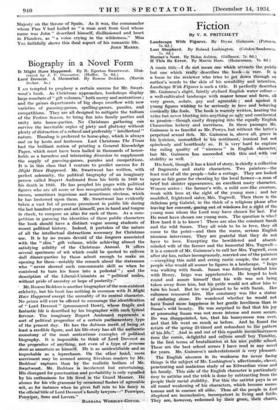Biography in a Novel Form
It Might Haye Happened. By R. Egerton Swartwout. Illui- trated by J. P. Doncaster. (Heifer. 7s. 6d.) Lord Dovecot. A Memorial. By Roscoe Beddoes. (Martin Seeker. 5s.) I Aat tempted to prophesy a certain success for Mr. Swart- wout's book. - As Christmas approaches, bookshops display
large numbers of " gift volumes," both merry and sententious ; and the ganles departments of big shops overflow with new varieties of guessing-games, spelling-games, puzzles, and competitions. They are all designed to mitigate the tedium of the Festive Season, to bring fun into family parties and unity into house-parties. No Christmas gathering can survive the inevitable orgies of piety and gluttony without plenty of distraction of a refined and preferably " intellectual " nature. 'Humbug is preferred to horse-play, which is always mal uu. by hosts and hostesses. Last Christmas The Times had the brilliant notion of printing a General Knowledge Paper, which must have been hailed in thousands of house- holds as a harmless and interesting diversion to supplement the supply of guessing-games, puzzles and competitions. It is in this class that I venture to predict success for It Might Have Happened. Mr. Swartwout has written, with perfect solemnity, the political biography of an imaginary person called Rupert Audenard from his • birth in 1849 to his death in 1933. He has peopled his pages with political figures who are all more or less recognizable under the false
names, sometimes ingenious, and: sometimes. obvious, which he has bestowed upon them. Mr. Swartwout has evidently
taken a vast list of persons prominent in public life during the last hundred years and set himself, pen in hand and tongue
in cheek, to compose an alias for each- of them. As a com- petition in guessing the identities of these public characters
the book should have a distinct vogue among students of recent political history. Indeed, it partakes of the nature of all the intellectual distractions necessary for Christmas use. It is by no means devoid of the longeurs associated with the " slim " gift volume, while achieving almost the satisfying solidity of the Christmas Annual. It offers several specimens of wit which could be quoted to enliven dull dinner-parties by those adroit enough to maiie an opening for them—notably the remark about the statesman who " never showed such consummate skill as when he contrived to turn his fence into a pedestal " ; and the description of the Liberal-Unionists as " mules, without pride of ancestry or hope of posterity."
Mr. Roscoel3eddoes is another biographer of the non-existent celebrity, but his book has nothing in common with It- Might Have Happened except the unreality of its central character.
No prizes will ever be offered to encourage the-identification of " Lord Dovecot " (pronounced Dowt), whose fragile and fantastic life is described by his biographer with such-lyrical fervour. The imaginary Rupert Audenard represents a sort of political progenitor of a certain parliamentary _type
of the present day. He has the dubious merit of being at least a credible figure, and his life-story has all the authentic monotony of the most sententious examples of- political
biography. It is impossible to think of Lord Dovecot as the progenitor of anything, not even of a type of jeunesse doree as uncertain as himself. He is as unidentifiable •and as
improbable as a leprechaun. On the other hand, more merriment may be aroused among frivolous-readers by Mr. Beddoes' raptures than by the realistic tedium of Mr. Swartwout. Mr. Beddoes is incoherent but entertaining.
His disregard for punctuation and probability is only equalled by his enthusiasm for life lived in the Grand Manner. He atones for his vile grammar by occasional liasheS of agreeable wit, as for instance when he gives full rein to his fancy in the official title of Lord Dovecot's family lawyers—" Penwiper, Penwiper, Sons and Lovers."
BARBARA WORSLEY-GOUGR.







































 Previous page
Previous page